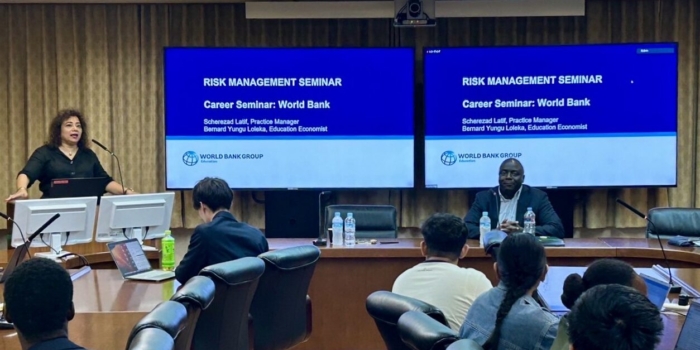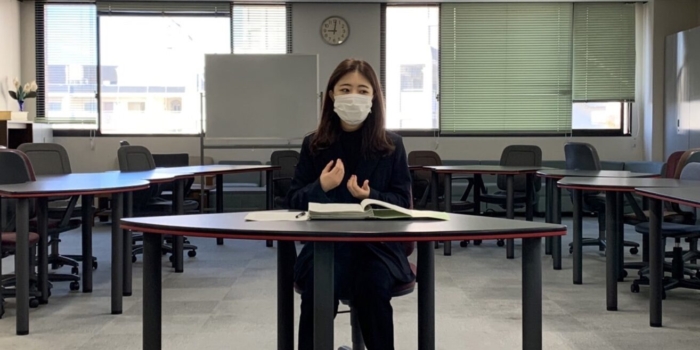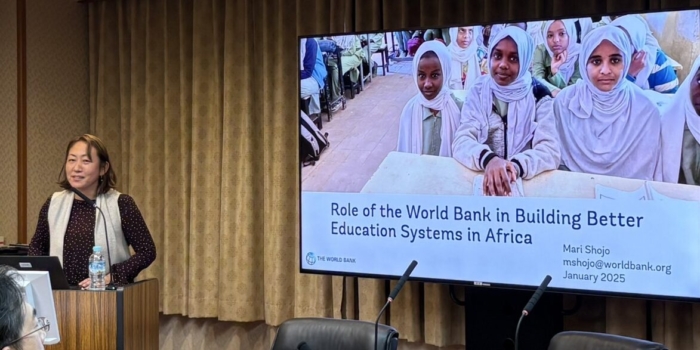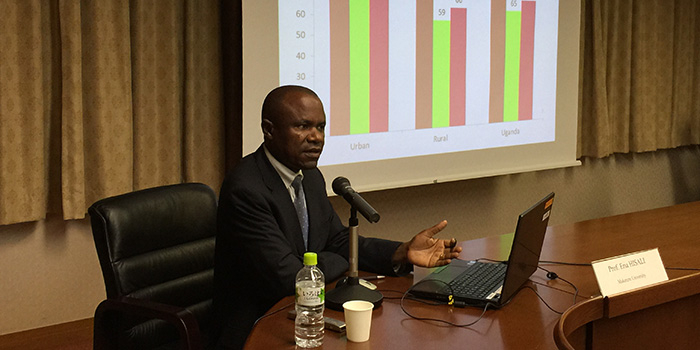On July 22, 2024, a hybrid seminar titled “Career Seminar: World Bank” was co-hosted by JASID Kansai and Kobe University Campus Asia in the main conference room at the Graduate School of International Cooperation Studies (GSICS), Kobe University. Dr. Scherezad Latif, a Practice Manager of Education Global Practice, Western and Central Africa Region at the World Bank, and Dr. Bernard Yungu Loleka, an Education Economist for the same region at the World Bank, were the lecturers of the seminar. Dr. Katsuki Sakaue, an Associate Professor at GSICS, chaired the seminar.
 Dr. Latif started her lecture by discussing the Sustainable Development Goal (SDG) 4 (Inclusive and equitable quality education and promote lifelong learning opportunities for all) and its progress to date. She outlined the indicators the World Bank uses to assess progress towards SDG4, including the Human Capital Index (Survival: will today’s born today survive to school age, Schooling: how much will they complete and how much will they learn, Health: will they leave school in good health) and learning poverty. She noted that Sub-Saharan Africa has the highest percentage of students in learning poverty. Dr. Latif also highlighted education challenges like learning crisis, skill constraints affecting education outcomes, and low financing in education.
Dr. Latif started her lecture by discussing the Sustainable Development Goal (SDG) 4 (Inclusive and equitable quality education and promote lifelong learning opportunities for all) and its progress to date. She outlined the indicators the World Bank uses to assess progress towards SDG4, including the Human Capital Index (Survival: will today’s born today survive to school age, Schooling: how much will they complete and how much will they learn, Health: will they leave school in good health) and learning poverty. She noted that Sub-Saharan Africa has the highest percentage of students in learning poverty. Dr. Latif also highlighted education challenges like learning crisis, skill constraints affecting education outcomes, and low financing in education.
 Additionally, Dr. Latif also discussed megatrends such as poverty, slow economic growth, climate change, the digital revolution, demographic shifts, and urbanization, all of which impact educational outcomes. She then discussed the World Bank education portfolio, including trending project implementation modalities like result-based financing, and the global impact of World Bank-supported projects. Emphasizing the Bank’s primary objective in education, “To End Learning Poverty,” she noted that 54% of the Bank’s education projects include at least one Literacy Policy Package (LPP) component. Dr. Latif also focused on foundational learning skills and, skills and tertiary education, and concluded her lecture by discussing cross-cutting themes in education, such as large-scale learning assessments, EduAnalytics (Bank’s toolkit for education data analysis), girls’ education, education financing, climate, and EdTech.
Additionally, Dr. Latif also discussed megatrends such as poverty, slow economic growth, climate change, the digital revolution, demographic shifts, and urbanization, all of which impact educational outcomes. She then discussed the World Bank education portfolio, including trending project implementation modalities like result-based financing, and the global impact of World Bank-supported projects. Emphasizing the Bank’s primary objective in education, “To End Learning Poverty,” she noted that 54% of the Bank’s education projects include at least one Literacy Policy Package (LPP) component. Dr. Latif also focused on foundational learning skills and, skills and tertiary education, and concluded her lecture by discussing cross-cutting themes in education, such as large-scale learning assessments, EduAnalytics (Bank’s toolkit for education data analysis), girls’ education, education financing, climate, and EdTech.
 Following Dr. Latif’s presentation, Dr. Bernard Yungu Loleka spoke on “Career opportunities at the World Bank Group.” He began by explaining what the World Bank is and the nature of its work. He elaborated on the benefits of pursuing a career at the Bank, detailing its core values: impact on a larger scale, integrity, respecting the client and the planet, promoting teamwork, and fostering innovation. Dr. Loleka then discussed various career paths at the Bank, including internships, consultancy, programs, and staff positions. He provided detailed information on the Bank Internship Program (BIP), Junior Professional Associates (JPA) program, Young Professionals Program (YPP), Short-Term Temporary (STT), Short-Term Consultant (STC), Extended-Term Temporary (ETT), and Extended-Term Consultant (ETC), administrative jobs, professional and technical jobs, and managerial jobs. Dr. Loleka concluded his lecture by explaining the World Bank’s recruitment process.
Following Dr. Latif’s presentation, Dr. Bernard Yungu Loleka spoke on “Career opportunities at the World Bank Group.” He began by explaining what the World Bank is and the nature of its work. He elaborated on the benefits of pursuing a career at the Bank, detailing its core values: impact on a larger scale, integrity, respecting the client and the planet, promoting teamwork, and fostering innovation. Dr. Loleka then discussed various career paths at the Bank, including internships, consultancy, programs, and staff positions. He provided detailed information on the Bank Internship Program (BIP), Junior Professional Associates (JPA) program, Young Professionals Program (YPP), Short-Term Temporary (STT), Short-Term Consultant (STC), Extended-Term Temporary (ETT), and Extended-Term Consultant (ETC), administrative jobs, professional and technical jobs, and managerial jobs. Dr. Loleka concluded his lecture by explaining the World Bank’s recruitment process.
An active question-and-answer session followed, with both online and in-person participants engaging enthusiastically. Professor Keiichi Ogawa made concluding remarks and conversed with the distinguished guests. Following Professor Ogawa’s remark, the session chair, Associate Professor Katsuki Sakaue concluded the session by thanking the lecturers and the participants.

Authored by Rakibul Hassan (Master’s Student)
Related











